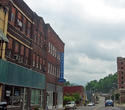Over the past few years resort communities - communities ideal for a ski vacation, a beach week, a hiking excursion or the like - have been hard hit by the downturn in real estate.
The key question is how these communities can be revived. If the issues involved are successfully addressed head-on, these small towns are able to provide significant amounts of affordable housing, viable and productive public transportation networks, and public functions such as parks, schools, police, and fire, despite limited financial and physical resources. read more »






















